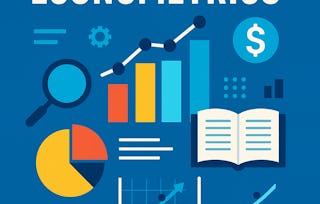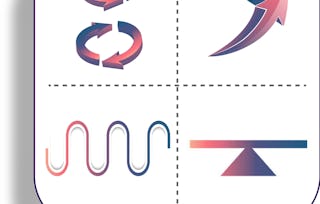The goal of this MOOC is to show that econometric methods are often needed to answer questions. A question comes first, then data are to be collected, and then finally the model or method comes in. Depending on the data, however, it can happen that methods need to be adapted. For example, where we first look at two variables, later we may need to look at three or more. Or, when data are missing, what then do we do? And, if the data are counts, like the number of newspaper articles citing someone, then matters may change too. But these modifications always come last, and are considered only when relevant.

Enjoyable Econometrics

138 reviews
What you'll learn
Explain the three basic methods of Econometrics.
Apply different econometrics models to examples of daily life.
Interpret and carry out several basic analysis strategies (correlation, regression and distribution.
Ask relevant questions that can be analysed with basic tools.
Skills you'll gain
Details to know
See how employees at top companies are mastering in-demand skills

There are 6 modules in this course
In this week you will be introduced to the MOOC Enjoyable Econometrics.
What's included
1 video1 discussion prompt
This week covers basic statistics like distributions, correlations and t-tests. You will be introduced to these concepts through real-life examples.
What's included
6 videos1 discussion prompt
Simple regression is the focus of this week, real-life examples will help you to apply your knowledge. This week ends with a test to check if you've mastered the content of the first three weeks.
What's included
4 videos1 discussion prompt
This week covers the topic of multiple regression, which is introduced to you through examples from practice.
What's included
3 videos1 discussion prompt
In this week you will encounter different variants of multiple regression illustrated with examples.
What's included
3 videos
The last week of this MOOC focuses on real life cases that require more advanced econometric methods.
What's included
3 videos1 discussion prompt
Instructor

Offered by
Explore more from Probability and Statistics
 Status: Preview
Status: PreviewErasmus University Rotterdam
 Status: Preview
Status: PreviewO.P. Jindal Global University
 Status: Preview
Status: PreviewErasmus University Rotterdam
 Status: Preview
Status: PreviewYale University
Why people choose Coursera for their career

Felipe M.

Jennifer J.

Larry W.

Chaitanya A.
Learner reviews
- 5 stars
54.34%
- 4 stars
25.36%
- 3 stars
6.52%
- 2 stars
5.07%
- 1 star
8.69%
Showing 3 of 138
Reviewed on Jul 14, 2020
Great first course for anyone interested in econometrics
Reviewed on Nov 30, 2019
This was a good, broad introduction to econometrics. It is simply an exploratory course and will not provide any in depth instruction which would be reserved for a more rigorous econometrics course.
Reviewed on May 19, 2021
Short and good intro with examples to build intuition around the econometrics concepts. Suggest to take this first before moving on to longer courses.

Open new doors with Coursera Plus
Unlimited access to 10,000+ world-class courses, hands-on projects, and job-ready certificate programs - all included in your subscription
Advance your career with an online degree
Earn a degree from world-class universities - 100% online
Join over 3,400 global companies that choose Coursera for Business
Upskill your employees to excel in the digital economy
Frequently asked questions
To access the course materials, assignments and to earn a Certificate, you will need to purchase the Certificate experience when you enroll in a course. You can try a Free Trial instead, or apply for Financial Aid. The course may offer 'Full Course, No Certificate' instead. This option lets you see all course materials, submit required assessments, and get a final grade. This also means that you will not be able to purchase a Certificate experience.
More questions
Financial aid available,

